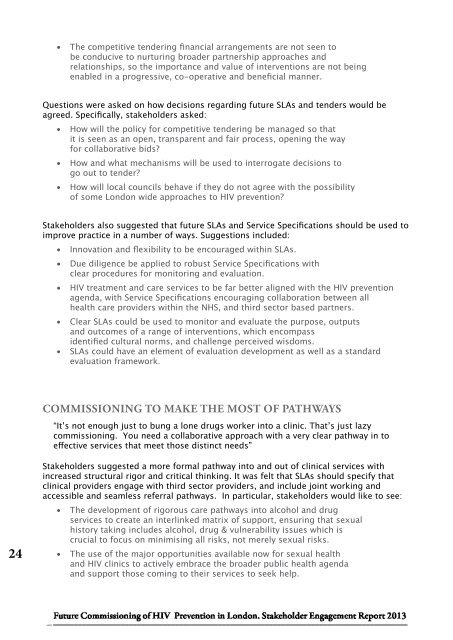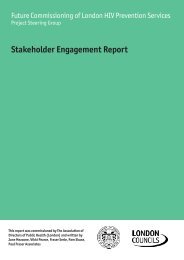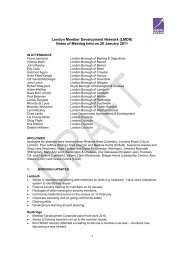Stakeholder Engagement Report - London Councils
Stakeholder Engagement Report - London Councils
Stakeholder Engagement Report - London Councils
Create successful ePaper yourself
Turn your PDF publications into a flip-book with our unique Google optimized e-Paper software.
• The competitive tendering financial arrangements are not seen to<br />
be conducive to nurturing broader partnership approaches and<br />
relationships, so the importance and value of interventions are not being<br />
enabled in a progressive, co-operative and beneficial manner.<br />
Questions were asked on how decisions regarding future SLAs and tenders would be<br />
agreed. Specifically, stakeholders asked:<br />
• How will the policy for competitive tendering be managed so that<br />
it is seen as an open, transparent and fair process, opening the way<br />
for collaborative bids?<br />
• How and what mechanisms will be used to interrogate decisions to<br />
go out to tender?<br />
• How will local councils behave if they do not agree with the possibility<br />
of some <strong>London</strong> wide approaches to HIV prevention?<br />
<strong>Stakeholder</strong>s also suggested that future SLAs and Service Specifications should be used to<br />
improve practice in a number of ways. Suggestions included:<br />
• Innovation and flexibility to be encouraged within SLAs.<br />
• Due diligence be applied to robust Service Specifications with<br />
clear procedures for monitoring and evaluation.<br />
• HIV treatment and care services to be far better aligned with the HIV prevention<br />
agenda, with Service Specifications encouraging collaboration between all<br />
health care providers within the NHS, and third sector based partners.<br />
• Clear SLAs could be used to monitor and evaluate the purpose, outputs<br />
and outcomes of a range of interventions, which encompass<br />
identified cultural norms, and challenge perceived wisdoms.<br />
• SLAs could have an element of evaluation development as well as a standard<br />
evaluation framework.<br />
Commissioning to make the most of Pathways<br />
“It’s not enough just to bung a lone drugs worker into a clinic. That’s just lazy<br />
commissioning. You need a collaborative approach with a very clear pathway in to<br />
effective services that meet those distinct needs”<br />
24<br />
<strong>Stakeholder</strong>s suggested a more formal pathway into and out of clinical services with<br />
increased structural rigor and critical thinking. It was felt that SLAs should specify that<br />
clinical providers engage with third sector providers, and include joint working and<br />
accessible and seamless referral pathways. In particular, stakeholders would like to see:<br />
• The development of rigorous care pathways into alcohol and drug<br />
services to create an interlinked matrix of support, ensuring that sexual<br />
history taking includes alcohol, drug & vulnerability issues which is<br />
crucial to focus on minimising all risks, not merely sexual risks.<br />
• The use of the major opportunities available now for sexual health<br />
and HIV clinics to actively embrace the broader public health agenda<br />
and support those coming to their services to seek help.




